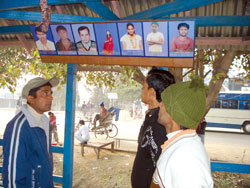|
|
| LIVES REMEMBERED: Photographs of the seven people killed by the army in April 2006 hang in a bus shelter in Belbari. |
As the transitional period drags on, spiraling lawlessness and impunity continue to erode the state's authority and capacity to get things done. While the seven parties are considering a truth and reconciliation bill, there are many who feel that the government has denied them justice by delaying it.
On 28 April 2006, indiscriminate army firing in Belbari, Morang, killed 6 people and 43 others, most of them innocent bystanders, sustained serious injuries. Two years on, no one has been punished or held to account.
Hem Sagar Dhakal, a young dentist who was standing just outside his clinic after seeing a patient, got hit in the head. He still has a piece of the shrapnel lodged in his skull. Doctors have warned that complications may arise if he tries to remove it here in Nepal.
The government gave him Rs 10,000 for treatment. But he has already spent more than Rs 200,000 from his own pocket. A neurologist in Kathmandu has advised him to go and see an expert in India and get the piece of the metal removed. "But it costs a lot and I can't afford it," says Dhakal. "It is very condescending. All the government has done so far is barely keep us alive," he laments.
In the same incident, a bullet whizzed through Gopal Chandra Gautam's cheek and popped out of his ear - knocking off his jaw and bursting his ear drum. He was in fact trying to hide in a safe place with some human rights activists, but that didn't help. A soldier deployed at the village bank started spraying bullets and one of them found its way to him. He continues to have problems opening his mouth.
As one meets more of the victims, the magnitude of this tragedy grows. There is real grief and pain here, but those at the helm seem too occupied with the grand narrative of new Nepal to have time to do anything about it.
Firoz Khan, an Indian national who sold bangles, had his wedding planned for just twelve days later in Bihar. Not only did he lose mobility in one of his legs after the incident, but his fianc?e left him.
A day after king Gyanendra conceded power to the parties, a group of locals went to thank the local army officials for avoiding any untoward incidents during the 19 days of uprising. The same night a local hotelier, Sapana Gurung, was gang-raped (a fact confirmed after DNA tests conducted by the parliamentary probe committee) by army personnel and later shot dead.
The next morning irate locals surrounded the joint security camp demanding action against the culprits. The army under the command of Captain Prahlad Thapa Magar resorted to firing indiscriminately at the crowd.
The parliamentary probe committee headed by Pari Thapa has just submitted a report indicting 28 officials including then chief district officer of Morang Narendra Dahal, police Superintendent Jagat Bahadur Bista, head of the Itahari-based army division Major General Om Bahadur Pun, head of the Bishnu Dal Battalion Sanu Tamang and Captain Prahlad Thapa Magar of Bishnu Dal.
Although the army says that captain Magar was suspended in the wake of the tragedy, locals claim that no action was taken against him and that he recently took a girl from Belbari as his wife.
Local political leaders say that the army was too trigger-happy. "The government's failure to act swiftly just adds to the growing culture of impunity in the country," said Iran Rai, a UML leader in the area.
At this rate, the government's actions or rather lack thereof may already be contributing to Nepal becoming a failed state.



